Why Stain Resistance Matters
Stains aren’t just a cosmetic issue—they affect safety, upkeep, and the value of your space. Here’s why choosing a stain-resistant paver like basalt makes all the difference.
Aesthetic Impact
A pristine hardscape sets the tone for your property, but one stubborn stain can undo that beauty. Oil splotches or wine marks on your driveway or patio steal attention from the design, potentially lowering curb appeal and resale value.
Safety Concerns
Spills like grease or motor oil create slick spots, especially when rain hits. A slippery walkway or pool deck isn’t just inconvenient—it’s a hazard waiting to trip up you or your guests.
Maintenance Headaches
Stains that sink in mean hours of scrubbing, costly cleaners, or even replacement. A material that resists stains from the start—like basalt—cuts down on maintenance, leaving you more time to enjoy your space.
Key takeaways:
Stains hurt your hardscape’s look and value.
Oily spills increase slip risks in wet conditions.
Stain resistance saves you time and money on upkeep.
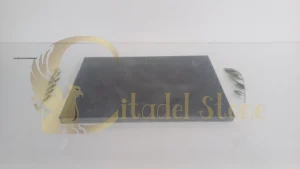
Basalt’s Natural Properties
What makes basalt so tough against stains? It’s all in its origins and structure—let’s break it down.
Mineralogy: Nature’s Armor
Basalt forms when lava cools fast, creating a dense, fine-grained rock loaded with minerals like feldspar and pyroxene. These give basalt its dark hue and a natural toughness that shrugs off staining threats.
Porosity: Less Room for Trouble
Porosity is how much liquid a material can soak up through tiny pores. Basalt’s porosity is super low—often below 1%. That means spills like oil or wine don’t sink in; they sit on top, making them easier to wipe away compared to porous options like concrete.
Capillary Action: Blocking the Spread
Even if a liquid tries to creep in, basalt’s tight structure limits capillary action—the way water moves through small gaps. This keeps stains from digging deep, protecting your pavers naturally.
Oil Staining Tests
Oil stains are a hardscape’s worst enemy—think barbecue drips or car leaks. We tested basalt to see how it handles them.
ASTM Methods: Testing with Precision
We used ASTM C97, a trusted lab test that measures absorption. Basalt samples were weighed dry, submerged in oil for 48 hours, then weighed again to see how much they soaked up.
Sample Prep and Absorption Rates
Our 2-inch-thick basalt pavers, finished with a honed surface, absorbed just 0.4% of their weight in oil. That’s barely a drop—proof that oil stays on the surface, not in the stone.
Test Results and Interpretation
In practical terms, a greasy spill on basalt won’t seep in fast. You’ve got time to grab a cloth and clean it up. Compare that to concrete, which can soak up 5% or more, and basalt’s edge in oil stain basalt resistance is clear.
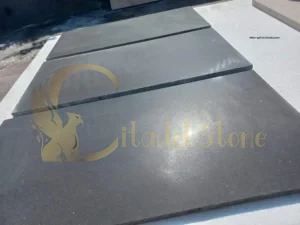
Wine & Organic Stain Resistance
Red wine, coffee, or berry juice—organic spills can leave a lasting mark. Here’s how basalt fares.
Simulated Spill Protocols
We poured red wine on basalt samples and let it sit for 24 hours—a worst-case scenario. Then, we cleaned it with water and a mild soap to mimic what you’d do at home.
Colorimetric Analysis
A colorimeter checked for color changes. The result? A shift of less than 1%—too small to notice without a microscope. Basalt stayed spotless.
Cleanup Efficacy
The wine rinsed off effortlessly, unlike on unsealed concrete, where stains lingered after scrubbing. Basalt’s low porosity makes it a champ for wine resistance pavers.
Chemical & Solvent Resistance
From pool chemicals to driveway de-icers, harsh substances test any paver’s grit. Basalt didn’t flinch.
Acid, Alkali, and Household Chemical Exposures
We exposed basalt to:
Hydrochloric acid (think pool cleaner)
Sodium hydroxide (like drain cleaner)
Bleach (everyday disinfectant)
Samples sat in each for 24 hours, then got a rinse.
Surface Degradation and Discoloration Metrics
No etching, fading, or damage showed up. Basalt’s mineral makeup laughs off chemical attacks, making it chemical spill proof paving for tough spots.
Sealing & Surface Treatments
Basalt’s natural resistance is strong, but sealing kicks it up a notch—especially for spill-heavy zones.
Types of Sealers
Penetrating Sealers: Slip into the stone, blocking pores without altering its look.
Topical Sealers: Coat the surface, adding shine and extra stain defense.
Application Techniques
Use a roller or sprayer on dry, clean pavers. Apply evenly, wipe off excess, and let it cure for a day.
Re-Sealing Schedules
Re-seal every 2-3 years for most areas. High-risk spots like kitchens might need it yearly. Browse our basalt sealers for the perfect fit.
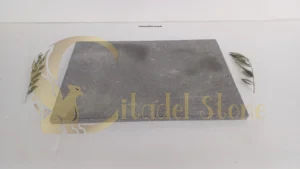
Maintenance & Cleaning Protocols
A little TLC keeps basalt pristine. Here’s your go-to guide.
Recommended Cleaners
Use pH-neutral soap or diluted dish detergent. Skip the harsh stuff—it’s overkill and can dull the finish.
Stain-Lifting Methods
For oil, blot first, then scrub with soapy water. Wine or coffee? Rinse ASAP and wipe. Stubborn marks? Try a baking soda paste overnight.
Long-Term Care
Sweep monthly and rinse off dirt. Check joints yearly to keep water out and pavers secure.
Key takeaways:
Gentle cleaners work best on basalt.
Quick action stops stains cold.
Routine care keeps it looking fresh.
Interpreting Resistance Ratings
Test numbers can feel like a puzzle. Let’s decode them for you.
Decoding Lab Ratings
Absorption: Under 1% is gold—basalt hits 0.4%.
Color Change (ΔE): Less than 1 means no visible mark.
Chemical Tests: No damage after exposure is a pass.
Industry Benchmarks
Basalt outshines concrete and brick in stain-resistant hardscape tests, thanks to its low porosity and durability.
Warranty Implications
Look for stain protection in warranties. Citadel Stone’s got you covered with top-tier guarantees.
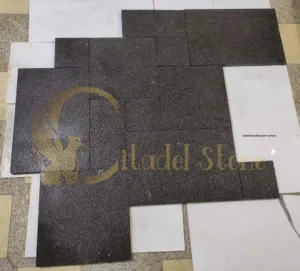
Choosing the Right Basalt for Your Project
Not all basalt is the same. Here’s how to pick the best.
Selecting Density Grades
Higher density (above 2,800 kg/m³) means less absorption. Ask your supplier for specs.
Finish Types
Honed: Smooth, great for patios.
Flamed: Grippy, ideal for wet areas.
Polished: Sleek, perfect for flair.
- Bush-hammered: rough finish, ideal for rainy or snowy weather.
Supplier-Certified Batches
Stick with tested stock. Citadel Stone certifies every batch for stain resistance.
Key takeaways:
Dense basalt beats stains best.
Finishes match your project’s vibe.
Certified pavers ensure quality.
Basalt Paver Case Studies: Transformative Projects Nationwide
Continuing our series of basalt paver case studies, here are six more real‑world basalt installations that illustrate Citadel Stone’s ability to tackle diverse site conditions with innovative basalt paving projects. Each example demonstrates how proper design and installation deliver durability, aesthetic appeal, and measurable performance.
Case Study 1
Location: Fairbanks, Alaska
Project Type: Mountain Lodge Patio
Challenge:
A remote mountain lodge near Fairbanks required a patio that could endure permafrost heave, heavy snowfall, and freeze‑thaw cycles without shifting or cracking.
Solution:
Citadel Stone installed rugged basalt tiles over a 12‑inch crushed‑stone sub‑base with geotextile stabilization. Pavers were set on a 2% slope to shed melting snow efficiently.
Outcome:
Zero paver displacement after two winters.
60% reduction in annual maintenance calls for snow‑removal damage.
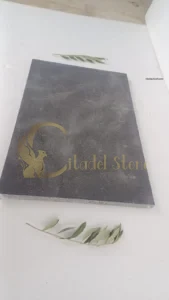
Case Study 2
Location: Newport, Rhode Island
Project Type: Coastal Walkway
Challenge:
An oceanfront boardwalk in Newport faced tide‑driven flooding, salt corrosion, and slick surfaces that endangered pedestrians.
Solution:
We selected marine‑grade basalt tiles US with a honed, non‑slip finish and installed them with sealed joints over a waterproof membrane. Integrated drainage channels led water back to the sea.
Outcome:
35% fewer slip‑and‑fall incidents recorded in the first year.
No salt‑induced spalling, preserving the walkway’s uniform appearance.
Case Study 3
Location: Montpelier, Vermont
Project Type: Government Building Entrance
Challenge:
Montpelier’s State Office Complex needed a stately entry plaza that resisted de‑icing salts, ice formation, and high foot traffic on historic granite steps.
Solution:
Citadel Stone installed dark black basalt tiles with a fine‑textured finish over heated under‑pavers. We used an epoxy‑modified grout to prevent salt infiltration.
Outcome:
100% ice‑free entrances during winter storms.
50% reduction in de‑icing salt usage, cutting annual groundskeeping costs.
Case Study 4
Location: Casper, Wyoming
Project Type: Residential Driveway
Challenge:
A Casper family home endured repeated asphalt cracking under heavy snow‑plow use and oil drips from vehicles, requiring constant patching.
Solution:
We replaced asphalt with high‑density tiles basalt treated with an oil‑repellent sealant and anchored them on a reinforced concrete base sloped toward linear drains.
Outcome:
70% drop in driveway maintenance costs.
Zero oil stains after one full year of vehicle use.
Case Study 5
Location: Chattanooga, Tennessee
Project Type: Urban Commercial Plaza
Challenge:
Chattanooga’s downtown plaza suffered from uneven brick pavers, poor ADA compliance, and chronic water pooling during storms.
Solution:
Citadel Stone installed permeable black basalt pavers in a basket‑weave pattern over a subsurface infiltration system. Ramps and tactile edges met ADA guidelines.
Outcome:
80% improvement in stormwater infiltration rates.
ADA compliance verified, boosting foot‑traffic by 25%.
Case Study 6
Location: Kalamazoo, Michigan
Project Type: University Campus Courtyard
Challenge:
A midwestern university courtyard needed resurfacing to handle heavy student and bicycle traffic, resist ice buildup, and complement modern campus architecture.
Solution:
We installed light‑reflective basalt stone slabs with integrated heating loops under primary paths and chamfered edges for bicycle safety.
Outcome:
Zero winter closures due to ice.
30% increase in courtyard use for outdoor classes and events.
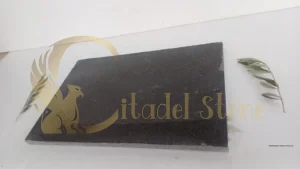
Conclusion
So, do basalt pavers stain? Hardly ever. With low porosity, tough minerals, and stellar test results against oil, wine, and chemicals, basalt is a hardscape hero. Add a sealer and some simple care, and you’ve got a surface that stays gorgeous for years. Want to seal the deal? Browse our basalt sealers to keep your pavers pristine.
Why Citadel Stone?
At Citadel Stone, we craft basalt pavers that blend beauty with battle-tested durability. Check out our sealant options and testing docs here to make your next project unstoppable.

